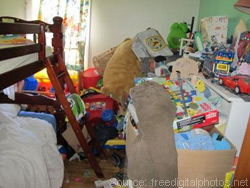We accumulate a lot of things over the course of a lifetime. Things we buy, gifts that we're given and trinkets and keepsakes that we find along the way all have a tendency to build up over time. Sometimes we can recognize when our time with a certain item is done and that we need to part ways with it, but other times we simply forget or allow nostalgia and sentimentality cloud our judgment. When this happens, it opens the door for clutter to take hold and begin pushing us out of our own living spaces.

Once it begins building up, it gets more and more difficult to manage, but the good news is that with enough time and preparation, you can defeat the clutter in your own home and begin working your way towards a newer, cleaner home with less clutter and more room to breathe. Getting rid of all of your clutter is only the first step though. Once it's gone, it will take a lot of work to stay organized and make sure that the clutter stays away for good. It might seem like too big of a task to handle for many, but with the right determination and attitude, just about anything can be accomplished.
This guide will give you some sage advice that you can follow that will help you cut down on that pesky clutter in your home and allow you to clear yourself some room to breathe around the house.
Take it room by room
Getting rid of the clutter in your house isn't something that can be done in one fell swoop. Don't be afraid to take your time when you're going through everything, because it's important that you take inventory of your clutter and carefully dispose of each item to make sure that you're not getting rid of anything you really need.
The best approach to take is to go through your home room by room. Start with the kitchen one day and be thorough about going through all of your clutter and once that's finished, tackle the next room and so on. Devote at least a full day to each room so that you can really do a complete cleaning and sort through your belongings in an organized fashion.
Rushing through this step will cause you to make decisions hastily and perhaps dispose of things that you really don't want to throw out. Instead, if you are undecided about getting rid of something, put it aside in a separate bin and store it someplace where you'll forget about it. Leave it for a month and if you find that you didn't need it, you can go ahead and get rid of it.
This method will ensure that you're only getting rid of things that you no longer have any use for, and it will also open your eyes to the reality of how clutter tends to accumulate so you can be better prepared for how to deal with it and prevent it in the future.
Keep a schedule and stick with it
Your clutter clean-up doesn't end when all of the clutter in your house has been eliminated. In fact, the process is only just beginning. Once you've finished the initial clean-up, the real hard work is making sure that you stay the course and that clutter doesn't just begin to accumulate all over again in the same places. You should think of it almost like trying to lose weight: the initial diet may help you lose a few quick pounds, but you'll most likely put that weight back on again if you go back to your normal eating habits after you ditch the diet. The trick is to keep eating healthy even after your diet to keep those pounds off.
The best method for making sure that your house stays clutter-free even after you clean it is to go back once a month and briefly assess all of the new clutter that has been accumulating since the last time you cleaned. Regular and repeated cleanings will help prevent the clutter from reaching an unmanageable level and along the way you might also learn a few lessons about how to eliminate the clutter from accumulating all together. If you stick to this plan and follow it frequently, it will prevent any substantial clutter from making your home feel crowded and stuffy.
Stay organized
In addition to going through each room of your house once a month to reduce clutter and prevent any additional clutter from building up, another key way in making sure that you don't end up filling your house with clutter all over again is by staying organized. Organization is clutter's worst enemy and believe it or not, it's a lot easier to stay organized than it seems.

Find yourself a nice set of bins, baskets, or drawers and start organizing your belongings in them. But remember to stick with it though! It can be easy to start stuffing things in random drawers and baskets and causing these things to become cluttered with junk as well, until you just forget about them after awhile. Try to stay organized and keep up with your effort to compartmentalize.
Labeling can also be your best friend in the fight against clutter as well. Carefully labeling your bins, baskets, containers and shelves will help to ensure that everything is placed where it needs to be and that unnecessary clutter and random items don't wind up where they're not supposed to be. When you use an item, make a conscious effort to put it back in the exact place you got it from and try to stay on top of your organization efforts.
Invest in some extra storage
Sometimes clutter is simply caused by having too many things and not enough places in your house to store them. While one solution is to go through all of your belongings and get rid of the things you no longer need, this may only solve the problem temporarily and you could be back to facing another mountain of clutter a few months down the road. In this case, perhaps you just need some extra room to store everything.
There is always the option to purchase some storage space at a nearby storage facility so you can have some extra storage to place your belongings. If that option doesn't appeal to you, consider creating more storage space within your house. If you have extra space in your garage or attic or basement that isn't being used, put up some shelves or cabinets and just like that you have brand new compartments where you can store a lot of belongings. Buying some more shelves, end tables or even furniture with built-in compartments or drawers will help you organize your things and keep you from tossing your clutter in a corner somewhere to be forgotten until the day comes when you need it, but can't find it.